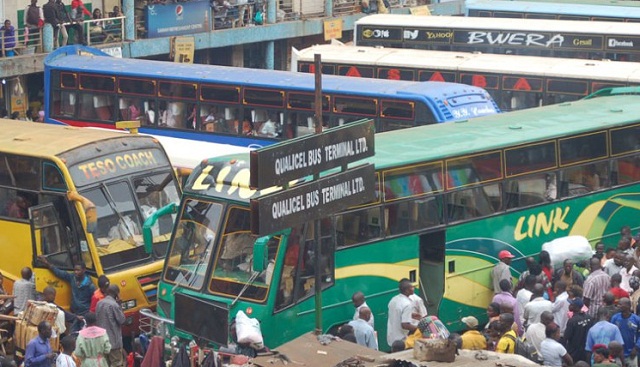
Kampala, Uganda | THE INDEPENDENT | Both Kisenyi and Namayiba bus terminals are popular spots for people traveling to and outside the city. The two bus terminals operate both day and night. On a daily basis, more than 100 buses enter or leave Kampala to different parts of the country including districts that neighbor the Democratic Republic of Congo- DRC, which is struggling to contain the deadly Ebola disease.
More than 3100 people have been affected since the disease broke out DRC. Although four people has so far succumbed the disease in Kasese, bus operators that ply the Rwenzuru route are relaxed, saying there is no more Ebola threat. The bus operators neither screen nor provide information to travelers about the highly contagious disease. At Link Bus terminal, the Ebola sensitisation materials are kept in the manager’s office under a pile of books collecting dust.
Tom Alinde, the customer service manager Link Bus Services, says that little or no public sensitization has taken place in the transport sector about the disease. He says for many, Ebola is no longer a threat in Uganda since there are no reported cases. “We have met with KCCA officials but that was at the beginning of the outbreak. Now, we have not heard from them. With their silence and attitude, there’s a general feeling that Ebola is out of Uganda. That it is no longer a threat to us,” he said.
According to the WHO general public guidelines on Ebola, members of the public are advised to keep a distance of at least 1 meter from suspected Ebola cases. Ebola is believed to enter the body through the eyes, mouth, nose, or breaks of the skin. People are advised against getting into contact with a suspected patient because the disease can be spread by coming into contact with body fluids of an infected person. To prevent Ebola, one is advised to wash hands with soap and water or alcohol based hand sanitizers.
At the bus terminals, no hand washing amenities are provided. There is no sign of water or soap or even hand sanitizers. Once a journey is completed, buses are taken to washing bays and are washed normally. No extra measures are taken to decontaminate them in case someone an undetected passenger had the disease. Alinde cites lack of resources as the reason why they have not installed some protective measures at the bus terminal.
“For the thermometers, we have never thought about it. We though they have to be used by only health workers. For others, the cost is too high,” he said. On the open market, an infrared thermometer, one of the equipment used to detect the Ebola Viral disease costs around Shillings 370,000 (USD 100). One liter of alcohol based hand sanitizer costs between Shillings 35,000-40,000.
According to the Health Ministry, Uganda has had over 700 Ebola alert cases. Only four of the alerts tested positive. To try and keep the situation at it is an Ebola response plan was launched by the Health Ministry in July 2019 worth Shillings 64 billion.
In Kampala, emphasis has been put on sensitizing people in the transport sector. This includes running spot messages on Television. According to Kampala Capital City Authority, their Ebola awareness plan is hinged on social mobilization, clinical care and surveillance. Dr. Daniel Okello, the Director of Health Services at KCCA, says they have trained people within the transport sector on how to deal with suspected Ebola cases.
Following the confirmation of three Ebola cases in June,2019, the regulatory body said they were planning on setting up a facility at in bus parks to assess suspected Ebola cases. The Authority has since given up on that idea.
However, some bus operators cannot identify a person with Ebola. Robert Agaba, a bus conductor with Baby Coach, says they don’t know how to easily identify an Ebola suspect. He says if someone is sick, they would have to report to them. “When someone is sick, they have to come and tell us. That is how it usually works. Us, we cannot tell if someone is sick just by looking at them,” Agaba said.
Saturday Muhwezi, the Operations and Security manage, at Namayiba bus terminal, says that they have received little or no education about Ebola. “The authorities came and talked to us in June. They have not been back. That one engagement was not enough. The only thing we know about the disease is that people with it vomit blood,” Muhwezi told URN.
Incase an Ebola case was confirmed in Kampala, the nearest health center fitted to receive them would be Naguru National Referral Hospital. The hospital is located 5 kilometers away from the bus terminal. Dr. Makanga Kizito, the head of the Naguru Isolation and Ebola Treatment Unit, says it is very important for everyone to be on highlight for the disease especially those in the transport sector. He says Ebola has mutated and is not easily identifiable as it was ten years ago.
While doctors are on standby waiting for any Ebola emergency and preaching the need of being alert at all times passengers that use public transport believe that they are safe. Nicholas Muwanga, a passenger who had traveled from Arua to Kampala via Friends Coach told URN that there is no need to take precautions like carrying hand sanitizer.
“Uganda has not had a case of Ebola. The ones that were reported were from DRC. I think we are safe,” he argued.
*****
URN
 The Independent Uganda: You get the Truth we Pay the Price
The Independent Uganda: You get the Truth we Pay the Price



